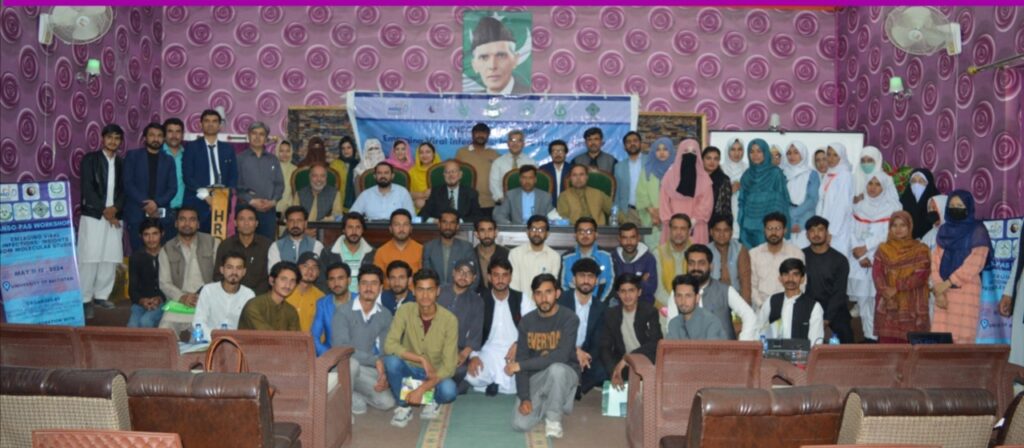
A Two Day Workshop on addressing the threats of emerging viruses of health
Skardu : Climate change and vanishing glaciers are posing challenges for the vulnerable communities in the North of Pakistan. One of the possible challenges is emerging viral infections that could affect the local human, animal, and plant populations. Another important factor is the region that connects great mountainous ranges (Karakoram, Hindukash and Himalaya) connecting China, Pakistan, Nepal, India, and central Asia. This unique characteristic makes this region very important for preparing the community response and preparedness for possible threats of emerging viruses. To elaborate the growing concerns, the ANSO-PAS Workshop was organized by the Alliance of International Science Organizations (ANSO) and the Pakistan Academy of Sciences (PAS) entitled “Emerging Viral Infections: Insight from Molecular Studies” and was supported by the University of Baltistan Skardu, Directorate Health Services Baltistan, Quaid-i-Azam University Islamabad, Federal Urdu University of Arts, Science and Technology, and the Pakistan Biological Safety Association. The workshop was convened at the University of Baltistan Skardu. With the participation of 110 attendees, this workshop delved into the intricate molecular aspects of emerging viral infections, shedding light on critical insights into the field. Dr. Zabta Khan Shinwari (Prof. Emeritus, Quaid-i-Azam University, Islamabad) graced the workshop with his presence, introducing attendees to the mission and mandate of ANSO.
Dr. Ashraf Hussain, Director Health Services Baltistan, was an esteemed presence at the event, emphasizing the pressing challenges and intricate nuances in managing current viral outbreaks. Additionally, a briefing on the state of health services in Baltistan was provided, outlining efforts and initiatives undertaken to address healthcare needs in the region and ensure equitable access to medical facilities for all residents. Dr. Saaed Khan, President of the Pakistan Biological Safety Association (PBSA), provided insights into the challenges associated with HIV treatment, shedding light on critical aspects pertinent to public health and safety.
Dr. Muhammad Ali, Principal investigator of the ANSO collaborative research project entitled Molecular detection and characterization of bat-borne viruses from Pakistan gave a brief talk on “Emerging Viruses their early detection and interventions: Scenario-based learning.” He emphasized the critical importance of proactive early detection and intervention strategies in combating emerging viruses. Through scenario-based learning, he highlighted the urgency for scientific communities to collaborate seamlessly, in order to effectively tackle future pandemics and safeguard global health security.
The workshop, with a particular emphasis on practical sessions tailored to address emerging viral infections from a molecular perspective, provided participants with hands-on experience. Speakers and trainers included Prof. Zhengli Shi (Wuhan Institute of Virology, Chinese Academy of Sciences) Dr. Ishtiaq Hussain (Associate Professor University of Skardu), Dr. Ikram Ullah (Assistant professor Hazara University, Mansehra), Dr. Ali Talha Khalil (Assistant professor, Molecular Biology, Lady Reading Hospital, Peshawar), Dr. Qandeel Zahra Zameer (Scientific officer (GBEPA) , Dr. Javed Muhammad Assistant professor (The University of Haripur) General Secretary (Pakistan Biological safety association), Dr. Sidra Rehman (Researcher, Department of Biotechnology, Quid-i-Azam University Islamabad), Mr. Amjad Khan (Researcher, Department of plant sciences, Quaid-i-Azam University Islamabad). The workshop concluded with Dr. Ali delivering a succinct takeaway message: “In the face of emerging viral infections, molecular insights are invaluable tools for proactive detection, swift intervention, and effective management. Let us remain vigilant, collaborate tirelessly, and harness the power of molecular techniques to safeguard global health.” The workshop aimed to provide participants with practical skills and insights into addressing emerging viral infections from a molecular perspective. It sought to foster collaboration and equip attendees with the knowledge necessary to effectively manage and mitigate the impact of these infections on public health.